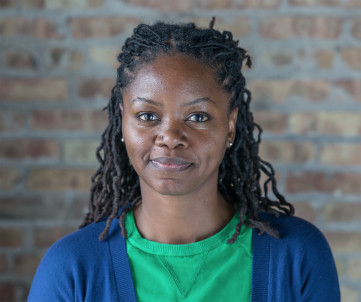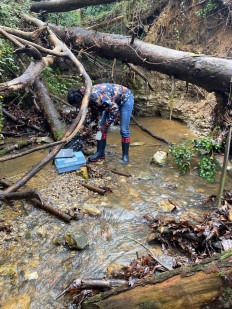 Kyana Young said she was not prepared for her first year in college but Mesa Community College gave her a second chance to launch a successful engineering and college faculty career focusing on global water quality issues. Reflecting on her own education challenges, the MCC Class of 2005 graduate has made it a mission to serve as a mentor to help underserved students achieve STEM (Science, Technology, Engineering and Math) careers.
Kyana Young said she was not prepared for her first year in college but Mesa Community College gave her a second chance to launch a successful engineering and college faculty career focusing on global water quality issues. Reflecting on her own education challenges, the MCC Class of 2005 graduate has made it a mission to serve as a mentor to help underserved students achieve STEM (Science, Technology, Engineering and Math) careers.
MCC was her choice because she wanted some place warmer than Michigan and, in addition to reasonable tuition, the partnerships with the Arizona state universities meant she could transfer directly after earning an associate’s degree.
Engineering Path
In high school, she excelled in calculus, chemistry and physics. After her first college attempt, she worked at a Michigan automotive factory. Because she did really well at all the STEM tasks and was 30 years younger than most of the workers, her supervisor suggested she go to college for engineering. He explained engineers used the science and math she enjoyed in many ways.
“MCC had all the engineering prep courses and my academic education was good even with some cultural challenges,” she said. “I think the model of community colleges is great, especially for returning students and those who need to accommodate work schedules.”
Kyana noted that females and students of color are still underrepresented in engineering but in 2003 she was a rarity in STEM classes and sometimes did not feel welcomed. In retrospect, she chuckled that she realizes the social awkwardness of engineers in general played a role in the class atmosphere.
Student Support
Kyana added, “I did connect with some faculty and with Nina Robinson (former director of MCC Multicultural Services) who was a really positive, bright spot for me. Knowing that an influential administrator was there to support me and was an advocate for me was so important.”
Nina developed the annual Diversity Leadership Camp where hundreds of students have been involved in activities to foster cultural awareness while developing positive cross-cultural relationships.
“It brought together students from all different backgrounds to talk about what prevents us from connecting with each other. There were powerful takeaways for me including that we can be creating our own barriers. We need to lead to create positive impacts with others in our communities.”
After earning her Associate in Science degree from MCC, she achieved a Bachelor of Science in Civil Engineering from the University of Arizona, and a Doctorate in Civil and Environmental Engineering with minors in Global Health, and Humans and the Global Environment from the University of Wisconsin – Madison.
She became an assistant professor, Department of Engineering at Wake Forest University (WFU), Winston-Salem, North Carolina, in 2019. She is also an affiliate faculty member in the WFU Biology Department and the Environment and Sustainability Program.
Leading to STEM

include exploring and
researching in the outdoors.
Kyana worked to place high school students in STEM business internships when she was a postdoctoral researcher at Marquette University in Madison. At Wake Forest, she started the Girls as Citizen Scientists for fifth through eighth graders to interest students in pursuing STEM classes in high school. Kyana also serves as the lead for undergraduate research for the Department of Engineering.
Kyana said “As an engineering professor, I teach students to think creatively, while using their technical skills to solve many of the global challenges communities experience. My expertise and research focus are in water treatment/quality, working with communities to improve their water infrastructure, and providing water systems following emergency situations such as natural disasters, internal conflicts, and outbreaks.”
January through July 2023, she will be on leave at a university in Kumasi, Ghana researching the costs and the associated health risks of relying on individual water bags as the primary source of drinking water. Also, her research will compare perceptions of water quality, economic costs, and the actual water quality in Ghana with communities in the United States where citizens have water quality concerns.
Kyana concluded, “As engineers, it is our job to let people know this field is for everyone. I have combined it with public health but you can connect engineering with so many other disciplines.”

